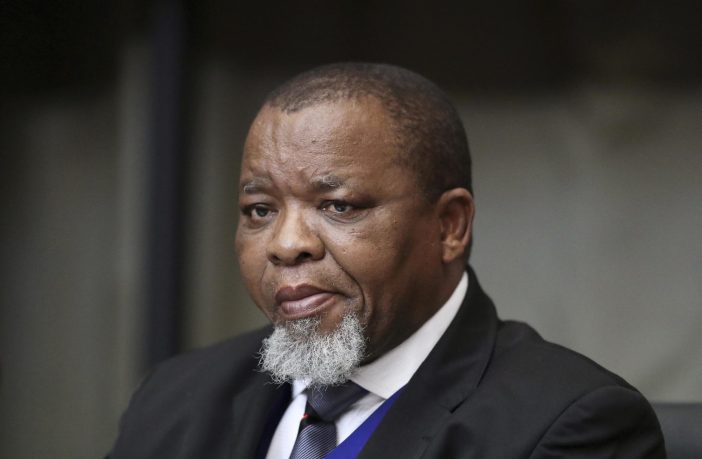Breaking News
- A high court has set aside a decision by Mineral Resources and Energy Minister Gwede Mantashe to grant Shell an exploration right, which would have allowed it to conduct a seismic survey off the Wild Coast.
- The ruling was handed down in the Makhanda High Court today.
The applicants made up of local communities, civil society organisation’s and environmental heavy weights like Greenpeace brought the court action action against Mineral Resources and Energy Minister, Gwede Mantashe and Shell. This followed a ruling made in the Grahamstown High Court back in late December 2021 which ordered Shell to immediately cease its seismic blasting along South Africa’s Wild Coast pending the hearing of Part B of the application – which seeks the court to review and set aside an exploration right allowing the survey to take place. The applicants also wanted the court to review and set aside the subsequent renewals of the exploration right- in 2017 and 2021 which they believe were unlawful and invalid.
Before the interdict came into effect in late December last year, the world’s largest seismic ship operated by Shell Exploration and Production SA’s partner, Shearwater GeoServices, the Seismic Warrior, had started to drag up to 48 air guns methodically through 6 011km² of ocean surface from Morgan Bay to Port St Johns for a period of 5 months. The air guns fire extremely loud shock wave emissions that penetrate through 3km of water and 40km into the Earth’s crust below the seabed. The blasting causes waves of sound of up to 220 decibels to reverbrate in the surrounding ocean which may harm ecologically sensitive marine life.
Findings of the Makhanda High Court:
The court found in favour of the applicants on all the grounds of review.
On the issue of public participation, the court found that it was incorrect for consultations to only be conducted with kings, monarchs and other traditional leaders and that such an approach “finds no space in a constitutional democracy” (para 92) and further, that “a chief does not denote a community.” (para 93). “There is no law, and none was pointed to, authorising traditional authorities to represent their communities in consultations.” (para 92)
The judge went further to find that “…meaningful consultations consist not in the ticking of a checklist, but in engaging in a genuine, bona fide substantive two-way process aimed at achieving, as far as possible, consensus…” (para 95).
On the issue of harms to the environment, the court found that due to the apparent dispute between expert evidence on the harms of seismic testing to marine life, a precautionary approach should have been adopted by the decision-maker. This applies particularly when there is uncertainty and requires risk-aversion and caution to be taken.
Further, the judge acknowledged the key role of the ocean in the livelihoods and spiritual and cultural life of coastal communities. “The applicant communities contend that they bear duties and obligations relating to the sea and other common resources like our land and forests; it is incumbent on them to protect the natural resources, including the ocean, for present and future generations; the ocean is the sacred site where their ancestors live and so have a duty to ensure that their ancestors are not unnecessarily disturbed and that they are content.”
There is no evidence, said Mbenenge JP, that the decision-makers took the potential harm to these religious and ancestral beliefs and practices into account. That rendered the decision unlawful.
In relation to climate change as well as the issues of the right to food, the judge found that, had the Minister taken these issues into account, he may have found that the project was “neither needed nor desirable” (para 125).
The court found that the Integrated Coastal Management Act needed to be considered in the decision-making process, which “introduces an integrated approach to management and in this instance, the decision-maker did quite the opposite and dealt with the application as an energy-sector specific issue.” (para 130). The court found that the Minister was duty-bound to consider the ICMA and this in itself, means that the exploration right must be reviewed.
The court also found that the applicants did not have to lodge an internal appeal as required by the Promotion of Administrative Justice Act (PAJA), as the commencement of the seismic survey at the time of launching the application was imminent. Furthermore, the Minister of Mineral Resources and Energy, Gwede Mantashe, who had previously referred to any opposition to oil and gas developments as “colonialism and aparthied of a special type”, could not be said to have considered the internal appeal with an open mind and therefore the applicants’ perception of bias was warranted.
Additionally, the court found that the Minister could have simply abided by the decision of the court in relation to part A (the interdict which was granted by Judge Bloem in December 2021) but instead decided to pin his colours to Shell’s mast by refusing to review the exploration rights awarded to them and opposing the interdict in part A.
Notably, the judge stated that Shell’s Environmental Management Programme (EMPr) contained statements promising jobs and increased government revenue. However, these claims were not supported by evidence in the EMPr. In paragraph 135 of the judgment, the court found that there was no explanation as to how jobs would be created, “or how the seismic survey will improve the socio-economic circumstances in which most South Africans live”. This was particularly important as Shell argued that the applicant communities, who are poverty-stricken, would benefit economically from their oil and gas exploits.
The respondents may now apply for leave to appeal the judgment to the Supreme Court of Appeal.
Author: Bryan Groenendaal















